Weekly ecommerce tips, deals & news.
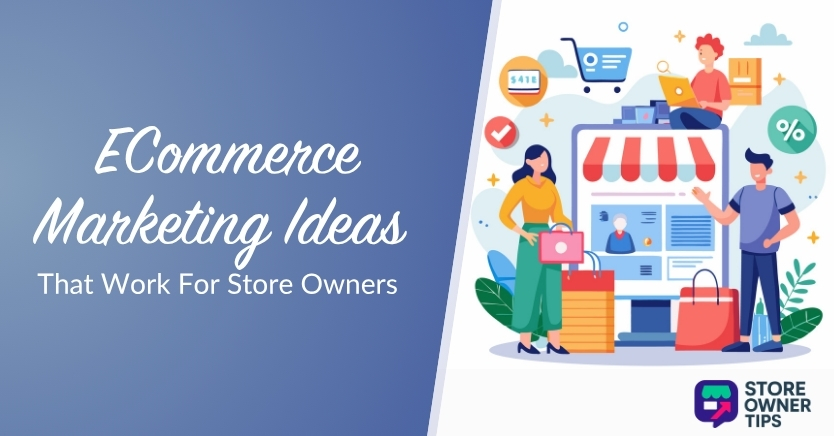
After launching your site and listing your products, the next big step is to get them discovered by shoppers. But how do you even get started, and what actually works? No worries—we’ve done the research for you! In this article, we walk you through the best ecommerce marketing ideas that successful store owners are using to stand out and sell more.
These ideas are practical, beginner-friendly, and flexible for any niche. Bookmark this guide and revisit it when you need inspiration for your next campaign. Let’s get right into it!
Ecommerce marketing encompasses all the strategies store owners use to drive traffic to their store, convert browsers into shoppers, and keep them coming back. Simply put, it’s how you promote your products and bring them in front of the right people.
To do this, store owners rely on a mix of marketing channels. Here are just some examples:
Successful stores often combine these channels, depending on their niche and business goal. Up next, we’ll walk you through strategies that tap into these channels, alongside examples and ideas you can try today!
An irresistible welcome offer lowers the barrier to purchase and creates a strong first impression, especially when shoppers are discovering your brand for the first time. It can be something as simple as a percent discount, a free shipping offer, or a small gift for a purchase.
Most ecommerce brands pair their welcome offer with an email or loyalty program signup form. Aside from encouraging first-time orders, it also helps you build your list for future promotions.
Take a look at this example from Levi’s:
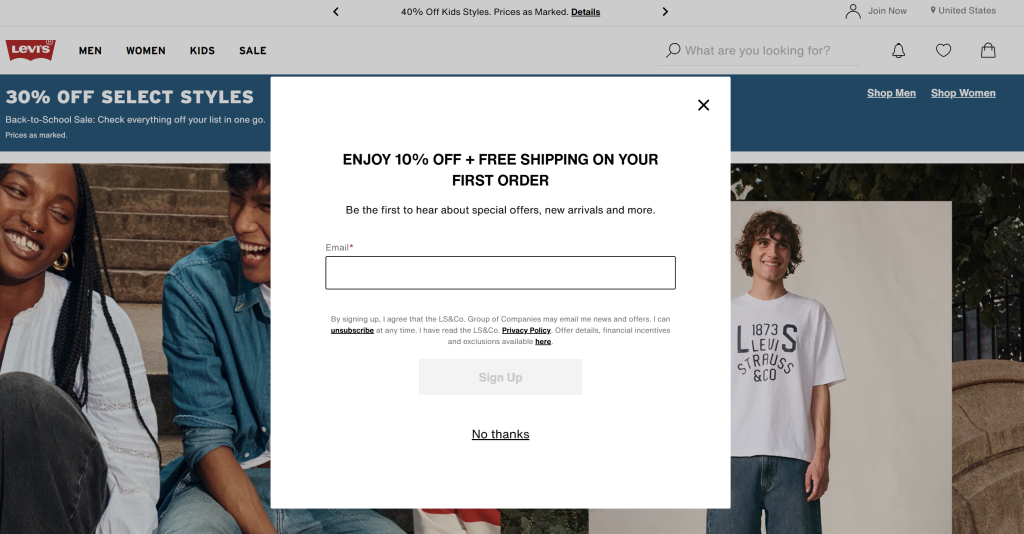
This offer is effective because it combines two strong incentives (a discount and free shipping) with a simple email opt-in form, making it easy for first-time customers to take action.
Increasing your store’s order value doesn’t have to feel sleazy! Cross-selling and upselling can help you enhance the shopping experience, while also nudging larger cart orders.
These ecommerce marketing ideas work because they give shoppers relevant suggestions without interrupting the flow of their purchase. Let’s take a look at a classic example from Samsung:
With their comparison tool, shoppers can easily compare features, specs, and pricing between different phone models. It’s a powerful way to deliver value and nudge an upgrade!
Push notifications are short, clickable messages that pop directly on your customer’s device, even when they’re not browsing your store. According to industry insights, their open rates reach as high as 90%! Because of their real-time nature, push notifications are perfect for creating urgency and promoting time-sensitive offers.
Here are just some creative ways to use them:
💡 WooCommerce store owners can use tools like PushEngage to send out push notifications, schedule them, and even segment by audience behavior.
User-generated content (UGC) refers to any form of content shoppers create about your brand and products. Think unboxing videos, social media posts, product reviews, and even selfies using your products.
They’re powerful trust-builders and are often more persuasive than traditional advertising, as they showcase real customers and real results. According to a recent industry survey, 86% of shoppers are more likely to trust a brand that showcases user-generated content.
This is exactly why top brands leverage UGC to foster customer trust and loyalty. Take a look at how Fenty Beauty features UGC on their homepage:
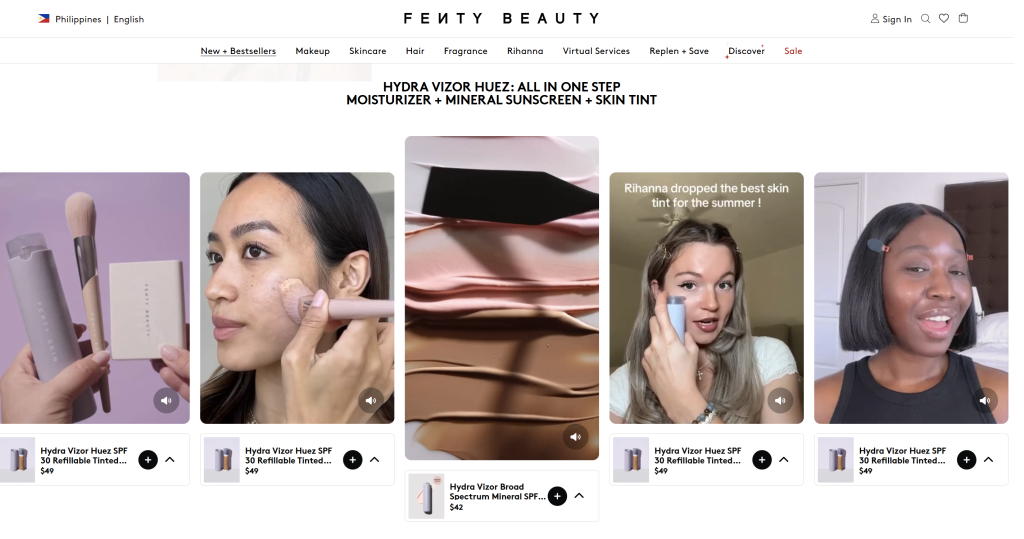
Fenty Beauty highlights customer-generated videos from social media to introduce their products, helping shoppers visualize how the products work in real life.
💡 BONUS TIP: Encourage UGC by offering loyalty points or incentives for reviews, and by featuring your customer content on your socials!
Launching a loyalty program is one of the best ecommerce marketing ideas for long-term growth. By rewarding customers with redeemable points for each purchase, you give them a compelling reason to return to your store again and again.
Some of the biggest beauty brands like Sephora leverage this strategy very well. Their Beauty Insider program allows customers to earn points for every purchase and redeem them for products and exclusive experiences.
If you’re running a WooCommerce store, you can use plugins like WooCommerce Loyalty Program to easily launch a points-based rewards system and grant points for actions like:
Tapping into key seasonal moments throughout the year can help your brand stay relevant and top of mind for customers. During shopping seasons like Black Friday, back-to-school, Valentine’s Day, and year-end holidays, buyers are already looking out for the best deals! It’s your chance to bring your offers in front of the right people.
The key here is planning ahead. Most brands use a promotional calendar to pinpoint which events to launch campaigns for. Doing so can help you prepare themed graphics, product bundles, and discounts that match the season.
Starbucks is a brand that does this really well. They launch exclusive seasonal drinks and themed merchandise alongside holidays and seasons. These timely releases spark excitement and drive loyal customers back to their stores.
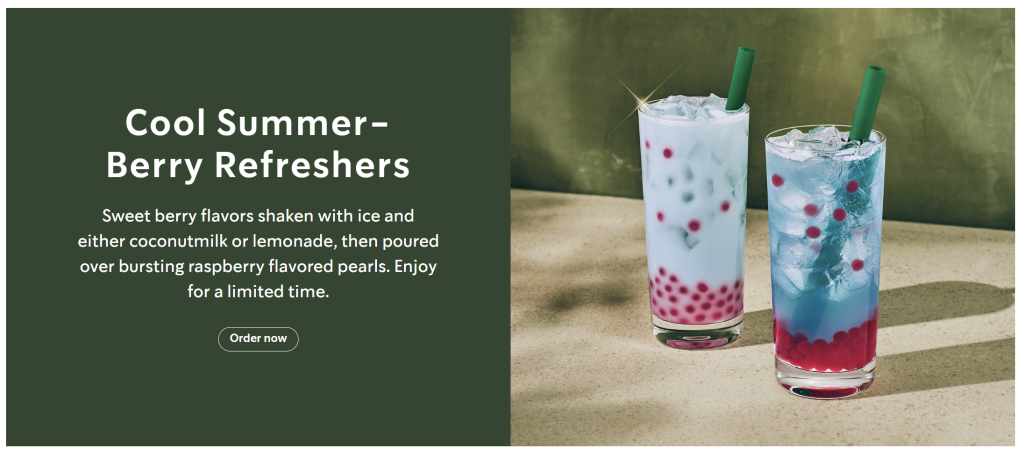
💡 BONUS TIP: If you’re using WooCommerce, you can leverage plugins like Advanced Coupons to schedule your discounts ahead of time. They also offer ready-to-launch coupon templates for holidays and special occasions—perfect if you’re looking for inspiration!
When we think of ecommerce marketing ideas, we’re likely to think of SEO, social media, or email first. However, optimizing your product pages is just as important as getting the word out there.
Well-optimized product pages remove friction in the buying process by answering common questions and helping interested buyers visualize how the product fits into their life. In fact, industry insights reveal that well-written product descriptions can increase conversion rates by up to 78%!
Here are just a few key elements you should pay attention to:
💡 BONUS TIP: AI tools like StoreAgent can help do most of these tasks like writing SEO-optimized product descriptions, adding a review summary on product pages, generating product tags, and more.
Brands generate buzz and spark shopper engagement by hosting giveaways and contests. Since entries for these often involve actions like following your brand, tagging friends, or signing up for your email list, it’s also a great way to expand your reach and build a community around your business.
Here are just a few examples you can consider for your next giveaway:
To make the most of your giveaway, make sure to set clear rules and deadlines, pick a prize that’s relevant to your audience, and provide shoppers an easy way to join.
Regularly posting relevant content can help drive organic traffic to your store and position your business as an expert in your niche. The key is publishing content that focuses on topics that matter to your audience. Your blogs should answer their questions, solve their problems, and gently guide them towards making informed purchases.
A great example is Glossier’s “Into the Gloss” blog, which features beauty interviews and valuable skin-care tips.
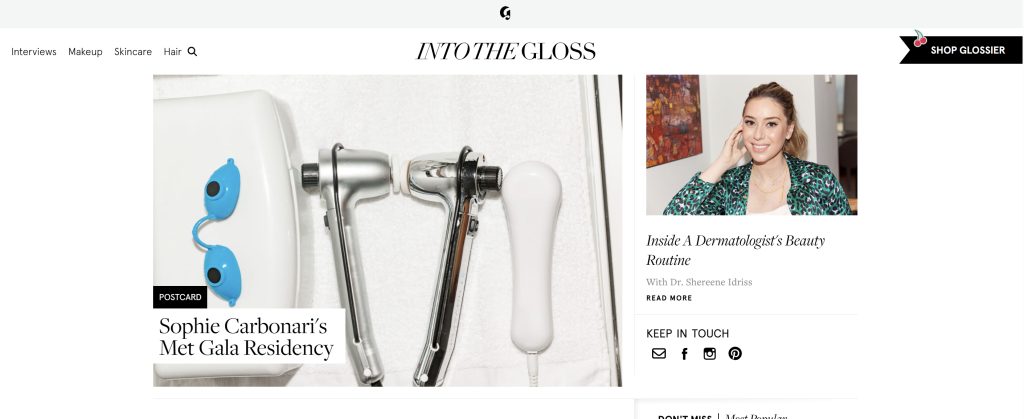
Here are a few effective types of content you can post, depending on your niche:
Retargeting allows store owners to run personalized ads to people who have already visited or interacted with your store. These shoppers might have browsed a product, visited your homepage, or added something to their carts, then left. Reminding them of what they viewed or left behind can help nudge them to complete their order.
Most store owners use Google Ads or Facebook Ads to set up retargeting campaigns based on actions like page visits, cart actions, or product views. Another option is setting up abandoned cart campaigns that automatically send follow-up emails to bring shoppers back to your store.
💡 BONUS TIP: If you’re using WooCommerce, you can use tools like AdTribes to sync your product listings with Google Shopping and Meta Ads, ensuring your catalog is up-to-date across different marketing channels.
SMS marketing is one of the most underrated ecommerce marketing ideas, but it’s incredibly effective. SMS messages boast open rates as high as 98%, making them a perfect platform to announce time-sensitive notifications like:
For maximum impact, keep your messages short and action-driven. You can include URL coupons that automatically apply during checkout to make promo redemption easier for customers.
Website pop-ups and banners are one of the most versatile marketing tools you can use today. They allow you to highlight offers, events, and important brand announcements.
Most brands use a combination of a floating bar to promote ongoing deals and well-timed pop-ups to capture email signups. Check out this example from Lululemon:
They combine a subtle floating banner to highlight free shipping and returns, with a bold pop-up that offers 10% off for new email subscribers.
Here are a few creative ways you can use pop-ups and banners on your ecommerce site:
While there’s no one-size-fits-all marketing strategy that’s effective for everyone, successful campaigns typically use a mix of SEO optimization, email marketing, social media, SMS, push notifications, and content marketing. These channels help drive organic traffic, reach more customers, and keep your business top of mind. Your unique approach will depend on your niche, product type, and target audience, so it’s important to try out different platforms, track results, and optimize your marketing strategy over time.
Products with consistent demand, such as skincare, pet supplies, fitness products, and home essentials, are some of the best picks for store owners. When starting a new business, look for products that solve a problem and tap into a niche market. Ideally, your products should be lightweight, easy to ship, and have good margins.
Running compelling promotions and improving the overall shopping experience can help you boost ecommerce sales. Start by optimizing your product pages—make sure you provide clear descriptions, high-quality images, and real customer reviews. Then, offer promotions like discounts, free shipping, and loyalty rewards to incentivize orders. Make sure to spread the word through social media, email, push notifications, website banners, and other platforms. Using a multi-channel approach can help you reach more customers and keep your brand top of mind.
A huge part of growing an ecommerce store is spreading the word: letting customers know about your products and giving them a compelling reason to buy. Thankfully, you can use the ecommerce marketing ideas we’ve covered today to get started with confidence! These strategies are simple, actionable, and proven to help your brand reach the right people.
Here’s a quick recap of what we covered:
We hope this article helped you out! If you have any questions, feel free to comment them down below. We regularly publish tips and guides for store owners like you, so make sure to check back often. 😊
Copyright © StoreOwnerTips.com. All Rights Reserved.